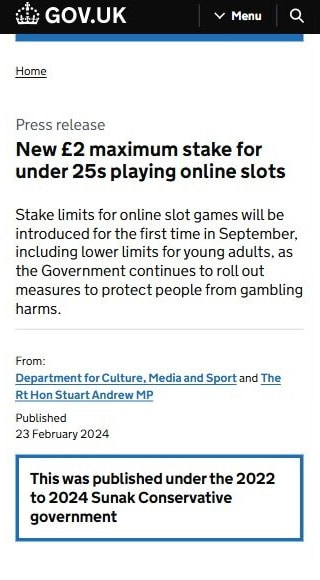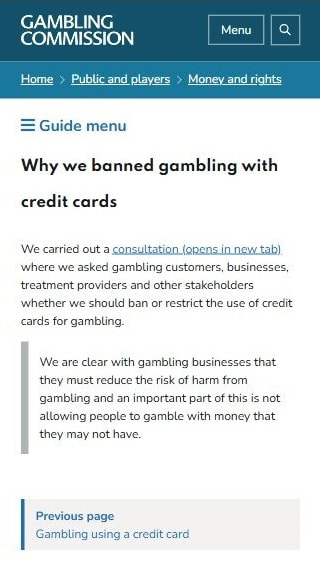Legal Gambling Age in the UK
The legal gambling age in the UK is 18 under Part 4 the Gambling Act 2005, which includes wagering at online casinos and sports betting sites.
Under the originally published Lotteries Act 1993 and Gambling Act 2005, the minimum age for lotteries and scratchcards was 16. However, this was raised to 18 when The National Lottery (Revocation and Amendment) Regulations 2021 were published.
| Online Casinos | 18 |
| Sports Betting | 18 |
| Lotteries | 18 |
| Scratchcards | 18 |
Unlike some other countries where gambling activities vary by activity or region, the UK strictly enforces the minimum age of 18 for all gambling participants. When registering at an online casino, you may be asked to prove your age. This is verified by uploading copies of your identification documents.
“To verify proof of age with an online casino, use your passport or driving licence as both feature your date of birth. Alternatively, send a copy of your birth certificate.”
Online Gambling Tax
In the UK since the abolition of such taxes in 2001, online casino players and sports bettors do not pay any taxes on betting stakes or gambling winnings. Instead, gambling operators are taxed under Part 3 of the Finance Act 2014.
“Your gambling stakes and winnings are not taxable in the UK. It’s the gambling operators who must pay taxes to HM Revenue and Customs. If an online casino is trying to charge tax on your deposits or withdrawals, this is a scam. You should be aware of your rights and file a complaint if this happens.”
According to Part 3 of the Finance Act 2014, online gambling operators are subject to various taxes, including the Remote Gaming Duty (21%), General Betting Duty (15%), and Pool Betting Duty (15%). However, these percentages may also be subject to changes, depending on UK government budget announcements.
Likewise, it’s important to reiterate that all such taxes are paid by the gambling operators, not the players. This includes professional gamblers in the UK, who are not taxed directly on their gambling profits, but may be charged income taxes on earnings from sponsorships and other activities.
| Remote Gaming Duty | 21% |
| General Betting Duty | 15% |
| Pool Betting Duty | 15% |
Maximum Bet Limits
Following a lengthy period of consultations, the UK government announced maximum stake limits for online slot games. These will be enforced by the UK Gambling Commission via updates to the Licence Conditions and Codes of Practice (LCCP). The limits are as follows:
- Maximum £2 stake limit for 18 to 24-year-olds.
- Maximum £5 stake limit for adults aged 25 and over.

Stake limits for online slots were first proposed in the High Stakes: Gambling Reform for the Digital Age policy paper, published in April 2023.
Although gambling operators did raise concerns about segregating age groups, there was overall agreement that stake limits needed to be introduced for online gaming products, and particularly online slots. However, this could lead to staking limits for other types of online casino games, and we’ll keep you updated on any changes as they come.
“Unlike land-based gaming machines, online slots previously had no statutory stake limits. Due to their ease of access, and consideration as one of the most addictive forms of gambling, the aim of the new stake limits is to reduce the risks of problem gambling.”
Credit Card Restrictions
The UK Gambling Commission introduced a ban on using credit cards for all gambling activities. This ban includes online betting, online casino and bingo, lotteries accepting payments online or over the phone, high street and track bookmakers, plus land-based casinos, bingo halls, and arcades.
Following consultations on restricting or banning the use of credit cards, the UKGC indicated that reducing harmful gambling was a priority. This includes preventing people from using credit or creating debts to fund their gambling activities.

Although credit cards are banned for gambling in the UK, there are plenty of suitable alternative options. These include debit cards, bank transfers, prepaid cards, pay by phone, and e-wallets.
Important: When using e-wallets for deposits, gambling operators may ask for proof that money was not loaded from a credit card.
We have listed the alternative payment options below, indicating those which are available or unavailable to gamblers in the UK.
Affordability Checks
Under the government review of gambling laws and regulations, published in the High Stakes: Gambling Reform for the Digital Age policy paper, proposals included the introduction of frictionless affordability checks, also referred to as financial risk assessments. The intention is to reduce harmful gambling among the most vulnerable people.
In response, the UKGC has already added section 3.4.6 to the Licence Conditions and Codes of Practice (LCCP) for gambling operators. This introduces a pilot phase, with the UKGC evaluating how these financial risk assessments might work in practice, if or when implemented.
The UKGC has stated that during the pilot phase, publicly available consumer data will be used, rather than data from credit reference agencies. Different consumer spending thresholds are also being tested. The first is conducting financial vulnerability checks when consumers deposit £500 net deposits, over a rolling 30-day period. The second reduces this threshold to £150 before checks are triggered.
“While the idea of affordability checks may seem intrusive to some people, they are not yet fully implemented. The UKGC is running a pilot phase with leading operators, testing how the process of financial risk assessments might work. We will keep you informed of any further regulatory changes.”
Although these affordability checks are not yet implemented, both the UKGC and the government has received significant pushback. Indeed, over 100,000 people signed a petition against affordability checks, leading to a parliamentary debate and an official response from the government.
Nevertheless, the pilot scheme to test financial risk assessments is already underway, running from August 2024 to March 2025 and using publicly available consumer data. Essentially, by testing ahead of any implementation, the UKGC is exploring the following questions:
- How could the data be presented to operators to help understand the level of financial risk and vulnerabilities associated with individual customers?
- How could operators build financial risk assessments into their overall customer interaction processes?
Once the pilot phase is completed and with further consultations based on their findings, the UKGC will decide whether or not to fully implement these affordability checks. If or when that happens, we will update this section with detailed information.
Restrictions on Gambling Advertisement
Under licensing conditions of the UKGC, gambling operators must comply with numerous laws and regulations for advertising and marketing. This includes adhering to the UK Advertising Codes, specifically the UK Code of Non-broadcast Advertising and Direct and Promotional Marketing (CAP Code 16), plus the UK Code of Broadcast Advertising (BCAP Code 17), both of which are administered by the Advertising Standards Agency.
The main focus of these gambling advertising laws and regulations includes the following points:
- No under-18 targeting: Ads must not appeal to or be directed at children or young people under 18.
- Avoid exploiting vulnerabilities: Ads must not exploit individuals’ financial, emotional, or psychological vulnerabilities.
- Social responsibility: Promotions must emphasise responsible gambling and avoid trivialising the risks of gambling.
- Clear and truthful claims: Advertisements must not mislead about winnings, odds, or terms and conditions.
- No celebrity or influencer misuse: Ads cannot feature individuals who may appeal strongly to under-18s.
- Prominent terms and conditions: Any significant limitations, terms, and risks must be clear and upfront in promotions.
- Prohibited content: Ads must not imply gambling is a solution to financial problems or promote excessive gambling.
Applicable laws include Part 16 of Gambling Act 2005, alongside revisions and amendments published in the Gambling (Licensing and Advertising) Act 2014.
“Advertising laws and regulations are strict for good reason, ensuring that gambling ads or marketing is fair, transparent, and socially responsible. They also protect minors and vulnerable people from misleading promotions or exploitative practices.”
Licence Requirements of the Gambling Commission
In order to legally offer any gambling services to customers in the United Kingdom, gambling operators including online casinos must hold a valid licence issued by the UK Gambling Commission.
To hold a UKGC licence, operators must adhere to all of the applicable Licence Conditions and Codes of Practice (LCCP) requirements. Failure to comply with the LCCP can result in stiff penalties and even licences being revoked.
While the LCCP is an extensive document covering all licensing regulations and requirements, here are some of the key points they establish:
- Fair and open terms to ensure transparency.
- Must display licensing details and make UKGC licence visible.
- Prevention of underage gambling with robust age verification.
- Promotion of responsible gambling and support player limits.
- Protect vulnerable players and provide self-exclusion tools
- Monitor customer behaviour to identify problem gambling issues.
- Combat risks of crime and adoption of anti-money laundering measures.
- Take market responsibility, avoid misleading adverts and marketing.
- Ensure financial security by protecting player funds.
- Offer a fair complaints process with independent dispute resolution available.
Relevant Laws in the UK
To conclude this guide page, we have listed the most important laws and acts of parliament that are relevant to gambling, so that you can access them whenever needed.
- Gambling Act 2005
- Gambling (Licensing and Advertising) Act 2014
- High Stakes: Gambling Reform for the Digital Age
- National Lottery Act 1993
- National Lottery (Revocation and Amendment) Regulations 2021
- Finance Act 2014
- Data Protection Act 2018
- Consumer Protection from Unfair Trading Regulations 2008
Moving into the iGaming industry was a natural progression for Heath, initially focusing on sports betting content for major brands. Following a trip to Las Vegas, that interest evolved to embrace online casinos, using his journalism background to explore and study gambling and gaming in fascinating depth.
